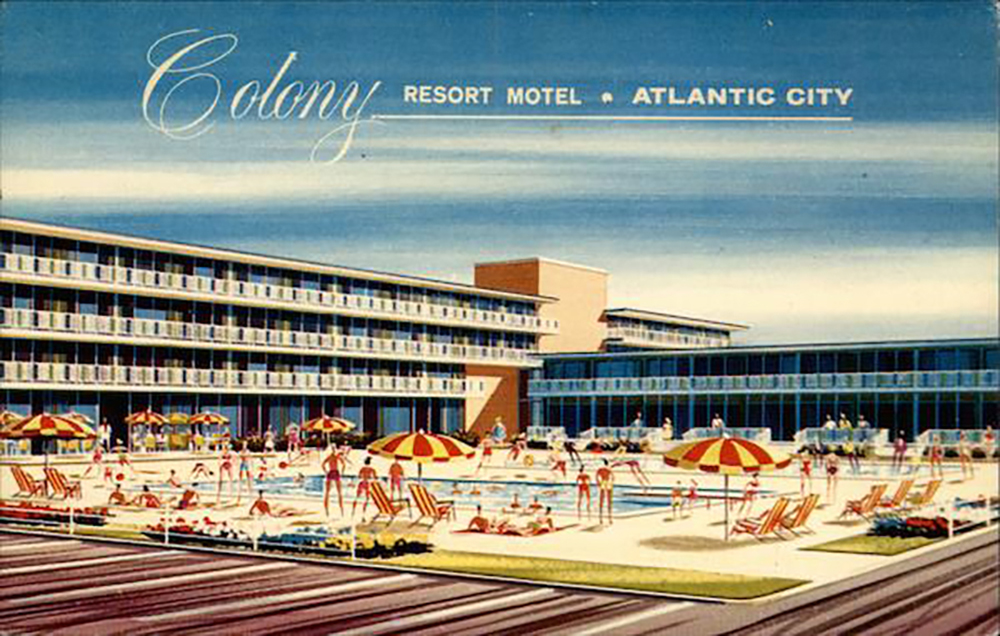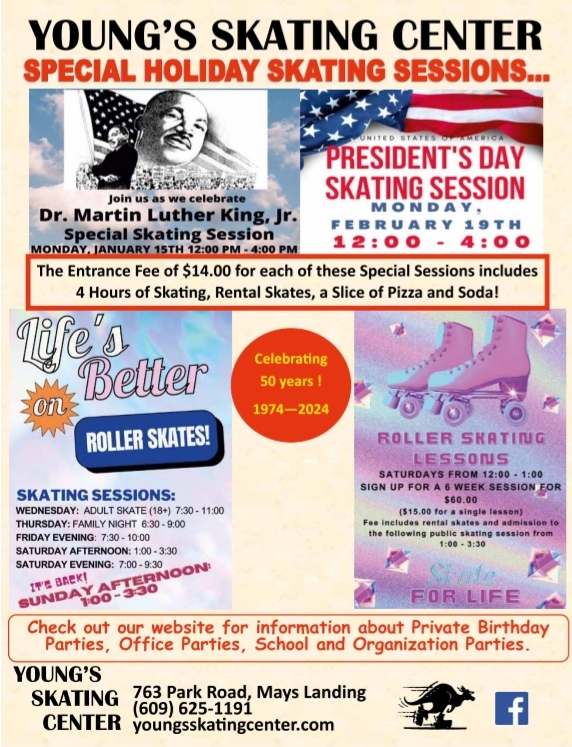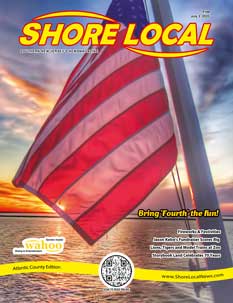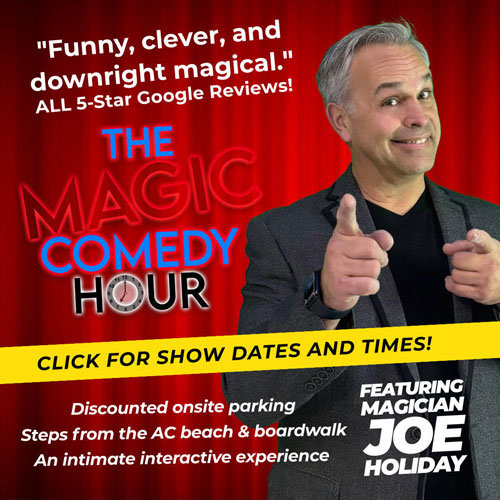By Bruce Klauber
Those even slightly acquainted with Atlantic City history may recall the names of some of the city’s better-known grand hotels from days of yore such as the Traymore, Dennis, or the Chalfonte Haddon Hall.
As astounding as it might seem today, in 1918 it was estimated that there were 1,200 hotels of various sizes in operation in the city, with 30 of them on the Boardwalk. These long-gone and long-forgotten venues helped shape the landscape and the legend that was, and to an extent still is, the Queen of Resorts.
Some were impressive, some innovative, some long-lived, and some spectacular. Here are just a few:
It’s claimed that The Brighton, built in 1873 at Indiana Avenue and the Boardwalk, was the first hotel in Atlantic City to open year-round. “Fancy” was often used to describe The Brighton, which was one of the last wooden hotels on the Boardwalk, as well as the only one with an outdoor swimming pool (so The Brighton said) until it was demolished in 1959.
Built on that site was the Colony Motel, later renamed the Colony Resort Motel, which was pretty glitzy for its time. The Colony advertised itself as “Atlantic City’s smartest and largest motel,” with 275 air-conditioned rooms, each with a television and Hi-Fi (can you imagine?), free parking, an indoor and outdoor swimming pool, an ice skating rink, coffee shop, and cocktail lounge.

COLONY RESORT MOTEL
As Atlantic City’s fortunes declined in the 1970s, the Colony tried to make a go of it by converting the motel into apartments. There is no record in the press of when the whole structure was demolished. Evidently, it wasn’t newsworthy enough. Sitting on the site today, just across from The Claridge, is a one-square block empty lot.
The Hotel Morton has quite a storied history and must have been some kind of place. Located on Virginia Avenue near the Boardwalk, the Morton evolved from a guest house to a full-blown hotel. Built in 1923, The Morton was the place to be for a number of years. WPG (formerly WFPG), Atlantic City’s first radio station, broadcasted from there. During World War II, The Morton became a Coast Guard training school. The hall used for the Coast Guard eventually became a theater where more than one Broadway-bound production had their tryouts.
The Morton was so popular, so elegant, and so close to the Steel Pier that a plethora of celebrities stayed there. The Beach Boys, Count Basie, Duke Ellington and Miss America contestants were among its famous guests. But it was demolished in 1977 and eventually replaced by the Taj Mahal Hotel and Casino, later the Hard Rock.
Another hotel located near the Steel Pier on Virginia Avenue, and another stopover for performers appearing in the Pier’s main showroom or the Marine Ballroom was The Albemarle. It had 92 rooms and popular enough to attract a SunRay Drugstore as a tenant, located on the hotel’s Pacific Avenue corner. Like many structures of that period, the Ablemarle was eventually condemned. It was torn down in 1970.
The Chelsea Hotel, at 111 South Chelsea Ave., has a lot of history. It survived fires, name changes, and almost a century of evolution in Atlantic City. The 250-room hotel opened in 1899, and was the visiting place for dignitaries including Woodrow Wilson and Franklin Roosevelt. It was so successful that management added 12 more stories in 1927. Like many of the city’s larger food and lodging venues, beginning in 1942 and until the end of World War II, The Chelsea was home to Army personnel.
It was still doing decent business into the 1970s, although the name had long ago been changed to the Sheraton-Deauville. A fire in 1975 caused significant damage. As the Deauville, it limped along until 1981 when it was demolished to make room for the Tropicana’s TropWorld.
Note: The “original” Chelsea Hotel is not to be confused with The Chelsea, which now stands as a part of the Tropicana and was formerly a Howard Johnson’s and a Holiday Inn.
Possibly one of the better known of Atlantic City’s forgotten hotels is The President. Built in 1926 at Albany Avenue and the Boardwalk, The President was the first hotel in the city to have an indoor pool and boasted a presidential suite, which was actually the hotel’s entire top floor.
Though first opened as a combination of apartments and a hotel, The President became a hotel-only venue by the mid-1930s. Like several of the larger hotels fronting the ocean in Atlantic City during World War II, The President was taken over by the military from 1942 to 1946.

THE PRESIDENT HOTEL
By 1968, the fortunes of most of the once-grand hotels were declining. The President became an apartment building until casino plans were proposed.
It took three attempts on Aug. 24, 28, and 30, 1979, to implode the once-grand hotel. The plan to build a Sahara Hotel/Casino on the spot never happened. What’s there now? A parking lot.
On May 23, 1974, The New York Times carried the following news item:
ATLANTIC CITY, May 22 (AP)—The Breakers, the oldest hotel in this city and the last to offer salt-water baths in all rooms, was demolished today.
Wreckers brought the 79-year-old, 12-story hotel down in seconds with three dynamite blasts. A neighboring hotel, The St. Charles, was dynamited on May 3 as part of the city’s urban renewal program. Both hotels were in a 60-acre, oceanfront tract that the city’s housing authority began clearing in 1967. So far it has not found a developer.
The blasting of The Breakers went off without incident shortly after 8 A.M. as hundreds watched under sunny skies.
For years many of the visitors who chose to vacation in Atlantic City were Jewish, and there were several hotels in the city of various sizes that catered to customers seeking a Kosher menu. The biggest and the most well-known was The Breakers.
Built in 1895 and first called the Hotel Rudolf, the future Breakers was originally five stories tall. Two decades later, brothers Joel and Julian Hillman bought the property and turned it into a 12-story hotel with a 17-story façade facing the Boardwalk.
It had a bathhouse, banquet hall, rooftop restaurant, and other amenities, and a new name – The Breakers. Capacity was 450.
When Emanuel Katz bought it in 1931. He put the hotel on the Atlantic City map when it became the first hotel in the city to observe Kosher dietary laws. Katz, perhaps, came up with The Breakers’ well-remembered catchline, “The Aristocrat of Kosher Hotels.”
But its demise was quick. After the U.S. Army used The Breakers as a barracks during World War II, the decline began. The reasons? Perhaps the same reasons that this hotel, and many of the town’s grander hotels gradually disappeared: Changing demographics, changing tastes, and changing times, among other factors.
The Breakers closed in 1965 and sat vacant on the parcel that is now the Ocean Casino Resort, until it was demolished nine years later. Maybe there just wasn’t room in Atlantic City any longer for a 450-room “Aristocrat of Kosher Hotels.”
Bruce Klauber is the author of four books, an award-winning music journalist, concert and record producer and publicist, producer of the Warner Brothers and Hudson Music “Jazz Legends” film series, and a working jazz drummer and vocalist since childhood. He served as Technical Adviser on the Oscar-winning film, “Whiplash,” and on the 2018 Mickey Rourke film, “Tiger.” He has been honored by Combs College of Music and Drexel University for his “contributions to music journalism and jazz performance.”

















